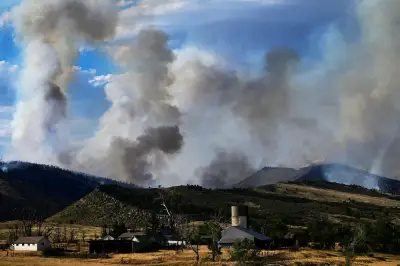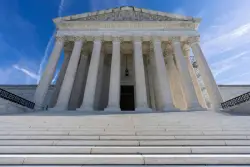As Colorado wildfires worsen, Sen. John Hickenlooper’s bill aims to reduce risks. But it worries some environmentalists.

A wildfire prevention bill championed by western U S senators including Colorado s John Hickenlooper aims to fast-track particular logging projects to reduce fire danger But several environmental groups say the bill would sideline the populace and skirt environmental protection laws Wildfires in Colorado are growing larger and spreading faster as state change-fueled drought desiccates the landscape and longer fire seasons create more opportunity for destructive blazes Four of the state s five largest fires have ignited since charring more than square miles combined The escalating problem demands a swift response Hickenlooper declared in an interview The wide-ranging -page Fix our Forests Act would address the problems by expanding prevention programs consolidating federal guidance and funding more research It also would streamline environmental and inhabitants review of wildfire prevention work like chopping down trees and prescribed burns We re trying to figure out how to do things faster Hickenlooper explained We re trying to do things faster because we can t wait four years or eight years to address this issue and obviously the administration that is in office now does not view it as a serious issue U S Sen John Hickenlooper top center listens during a roundtable discussion at the CU Anschutz Cancer Center in Aurora on March Photo by Helen H Richardson The Denver Post While the bill has backing from a contingent of environmental groups provisions that would eliminate environmental review for selected forest-thinning projects or shorten opportunities for community input have made other advocates wary especially as President Donald Trump s administration seeks to expand logging on populace lands Anything that puts power back in the hands of the cabinet and away from the people is a negative disclosed Will Roush the executive director of Wilderness Workshop a populace lands advocacy group based in Carbondale The U S Senate Committee on Agriculture Nutrition and Forestry heard the bill on May and the ordinance is now being revised through the markup process It will then return to the committee for a vote The bipartisan bill includes provisions that would Map firesheds where fire jeopardy is highest and create plans across agencies and governments to mitigate danger on private federal and local property Create a Wildfire Intelligence Center a joint office between the departments of Agriculture and Interior to serve as a national hub for wildfire prediction coordination and response so that states have a one-stop shop for federal materials Require a federal assessment of wildfire peril inside each fireshed and the identification of procedures to reduce risks Allow federal officers in an emergency to exempt wildfire resilience projects like forest thinning and prescribed burns from environmental review processes if they re in firesheds Establish intra-agency strike teams to expedite environmental review processes related to fireshed management Raise the threshold for requiring a competitive bid for timber sales from an appraised value of to Create a initiative to reforest federal lands Multiple environmental groups have signed on in assistance of the bill including the Nature Conservancy the Environmental Defense Fund and the National Audubon Society In Colorado Gov Jared Polis the Colorado State Forest Facility and the Colorado Division of Fire Prevention and Control have given their approval This critical statute will bolster our shared stewardship ethic in Colorado and enhance our ability as a state to improve forest healthcare protect lives communities and water supplies from wildfire and ensure that the forests that define Colorado endure for generations to come Matt McCombs Colorado s state forester and the director of the Colorado State Forest Facility disclosed in a announcement But Roush and other environmental advocates with reservations point to three parts of the bill that would limit masses participation and unravel protections Exempting specific wildfire prevention logging projects of up to acres or more than square miles from population comment and environmental analysis Previously projects could meet that exemption if they did not exceed acres Limiting the amount of time the constituents has to legally challenge a proposed project to days down from six years Removing a requirement that the U S Forest System redo forest planning processes when a new endangered species or critical habitat is determined Effective wildfire prevention starts by funding and staffing key agencies and investing in proven fire-mitigation techniques like home hardening and science-based forest management commented Blaine Miller-McFeeley the senior legislative representative of Earthjustice a nonprofit environmental legal group in a comment This bill instead would codify the Trump administration s attacks on our national forests and open the door for the timber industry to recklessly log our forests under the guise of forest management A tree stump remains in an area where fire mitigation projects have taken place along the Shadow Pine Loop trail at Flying J Ranch Park on September in Conifer Colorado Photo by Helen H Richardson The Denver Post Related Articles Grass fire burning along I- near RTD station under control executives say Suspect arrested in Summit County wildfire that closed I- Bipartisan vote kills governor s plan to lower homeowners insurance costs in Colorado Victim of Stone Canyon fire in Boulder County identified after lengthy analysis Trainwreck of NOAA funding cuts could derail Colorado research on wildfires earthquakes and storms Roush cited the impact of masses comment on a federal forest management plan that called for clear-cutting trees in the Upper Frying Pan Valley outside Basalt The input helped protect a cave and karst system and multigenerational aspen stands Roush mentioned When citizens communicated the Forest Institution about those unique information the institution altered its plans to protect those areas It didn t shut the project down or stop it from happening it just made it better for everyone and that s what would be lost without the opportunity for robust locality engagement Roush commented We felt like we got into a good compromise Hickenlooper noted that the masses should invariably demand the right to transparency but there must be a time limit It doesn t mean they can come back and start litigating years later Hickenlooper stated That just makes it impossible to get projects done The bill sponsors spent a year trying to find that balance as well as make compromises with Republican senators whose promotion will help the bill get funding he explained My grandfather used to say Only God is perfect Hickenlooper disclosed But this is pretty good Get more Colorado news by signing up for our Mile High Roundup email newsletter


